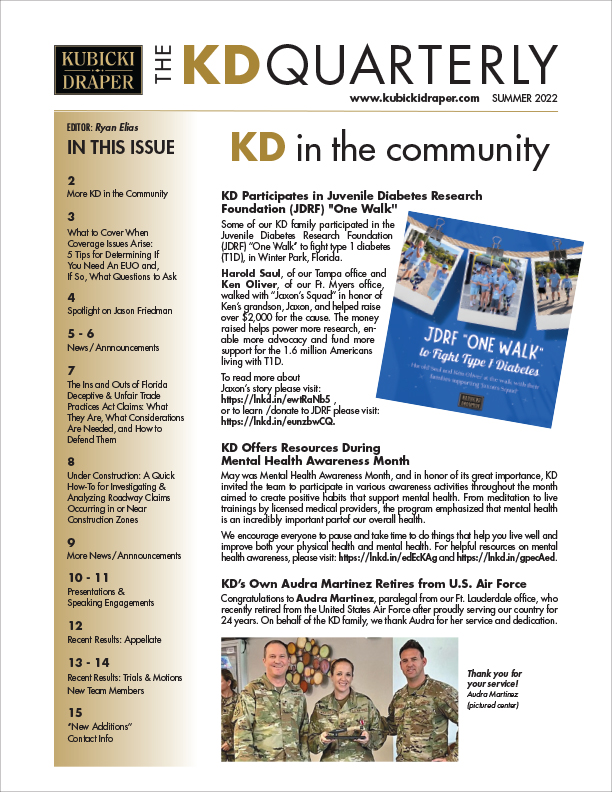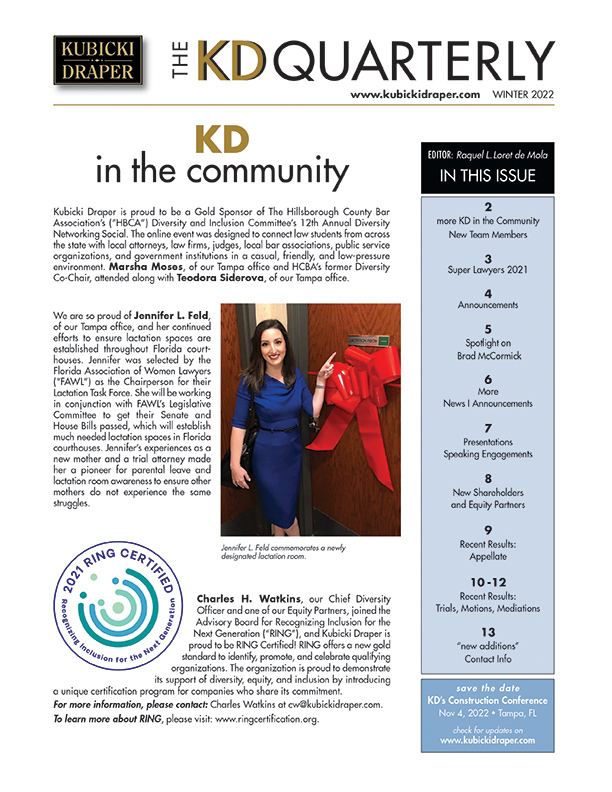As we know, there are known knowns; there are things we know that we know.
There are known unknowns; that is to say, there are things that we now know we don't know. But there are also unknown unknowns – there are things we do not know we don't know."
- Former United States Secretary of Defense, Donald Rumsfeld.
_______________________________
The Patient Protection and Affordable Care Act (Pub. L. 111-148), more commonly known as the "Affordable Care Act" or "Obamacare," was passed to a chorus of considerable fanfare and controversy on March 23, 2010. It was subsequently modified on March 30, 2010, by the Health Care and Education Reconciliation Act (Pub. L. 111-148).1 In 2012, the United States Supreme Court upheld the constitutionality of the majority of the provisions of the ACA in National Federation of Independent Business v. Sebelius.2 This article will examine some of the effects the ACA may have on personal injury litigation in Florida as well as some opportunities for reform as the ACA’s major provisions are implemented. However, as a caveat, and to paraphrase the former Secretary of Defense: There are some effects from this legislation and the ensuing regulations that we know; many that we know we don’t know; and many others that we do not know we don’t know. Thus, this article is simply a starting point for evaluating a few of the potential implications of the ACA on personal injury litigation in Florida.
Relevant Major Provisions of the ACA
This is not an exhaustive list of the ACA’s major provisions, but rather a summary of those that are most likely to either affect personal injury litigation in Florida or provide opportunities for future reform. Such provisions include:
- Guaranteed Issue. Prohibits insurers from denying coverage to individuals due to pre-existing conditions.
- Mandates. The Individual Mandate requires most individuals not covered by an employer sponsored health plan, Medicaid, Medicare or other public insurance programs (such as Tricare) to secure an approved private-insurance policy or pay a penalty (Section 1501). The Employer Mandate applies to businesses which employ 50 or more people but do not offer health insurance to their full-time employees. Such employers will pay a tax penalty if the government has subsidized a full-time employee's healthcare through tax deductions or other means.
- Expanded Medicaid Eligibility. Eligibility will now include individuals and families with incomes up to 133% of the federal poverty level, including adults without disabilities and without dependent children.3
- Medicare Payment System Reform. Medicare reimbursements are being restructured from fee-for-service to bundled payments, which is expected to result in overall lower reimbursements to Medicare providers.
What the ACA Does Not Do
Tort Reform. The ACA does not mandate or require tort reform, although it encourages states to develop and test alternatives to the existing civil litigation system as a way of . . . encouraging the efficient resolution of disputes, increasing the availability of prompt and fair resolution of disputes, and improving access to liability insurance, while preserving an individual's right to seek redress in court." Sec. 6801.
Medicare Liens. The ACA does not directly affect the manner in which Medicare or CMS collects or enforces liens against primary payors, such as liability and workers’ compensation carriers, under the Medicare Secondary Payor Act. However, there is an unknown in this area, as the ACA does require health care providers who participate in Medicare to "report and return" any overpayment within 60 days of the identification of the overpayment. Social Security Act, 42 U.S.C. Section 1128J(d). Under the ACA, the retention of an overpayment after the 60-day deadline is a false claim and subjects the provider to severe penalties, including qui tam actions and civil monetary penalties. 31 U.S.C. Section 3729(a)(1)(G), 31 U.S.C. Section 3720 et seq.
It is not entirely clear under the current set of regulations whether and to what extent primary payors, such as liability and workers’ compensation insurers, or individual Plaintiff/Medicare beneficiaries, will be affected by the "overpayment" provisions of the ACA. However, this provision may be used to encourage plaintiff’s attorneys to promptly resolve Medicare liens when cases are settled or risk potential penalties for retaining a Medicare overpayment.
What We May Expect as Major Provisions are Implemented
To underscore the uncertainty that the ACA will have on the world of insurance claims and litigation, in an article published in March 2013 in The Insurance Journal4 with a target audience of property & casualty actuaries, the authors concluded that the ACA could significantly affect property & casualty insurance, "although as of now it is hard to tell what impact the reforms will have on liability and costs. . . . The changes could either increase or decrease liability and costs in medical malpractice and workers' compensation but the impact will differ by state as both lines are sensitive to state laws and regulations."5
Some of the primary considerations the authors took into account were the individual and business mandates, which, once fully implemented, should result in an increase in the number of people who have health insurance. The mandates are intended to result in nearly-universal coverage. Section 1501, the individual mandate, requires that most Americans maintain "qualified" health insurance coverage, with a number of categories of exemptions. Nonexempt individuals who do not comply with the mandate are subject to a "penalty of the greater of $695 per year up to a maximum of three times that amount ($2085) per family or 2.5% of household income."6
While the authors commented on medical malpractice and workers compensation and did not address any particular states, the impact in Florida may be significant. A large increase in the number of litigants with health insurance may lead to a reduction in the number of plaintiffs that treat under letters of protection (LOPs) and their accompanying grossly inflated medical charges. More Plaintiffs treating through health insurance rather than under an LOP also means that under Florida’s collateral source statute,7 a larger percentage of gross medical billing amount should be subject to post-verdict set-offs under Goble vs. Frohman.8 Additionally, as the insured population presumably increases, one of the primary rationales for treating patients under an LOP will vanish; namely, doctors that treat patients under LOP will no longer be able to justify LOPs as a mechanism to provide health care for those who cannot afford coverage.
In the medical malpractice arena, the authors of the Insurance Journal article speculate that an increase in those covered by health insurance may "reduce medical malpractice liabilities if new insureds are able to visit doctors earlier than they would have without insurance and receive earlier treatment. Early treatment could lead to better medical outcomes and thus help prevent the adverse outcomes that can trigger malpractice lawsuits."9 Conversely, the increase in the insured population could raise medical malpractice liability, "as more patients per unit exposure would imply more potential risk. Too, a physician shortage could impact the frequency of medical errors."10 The potential of a doctor shortage was also cited as a risk for increased costs in the workers' compensation arena "if a doctor shortage delayed treatment and a return to work." However, on the other hand, costs may be reduced for comp carriers if "greater access to health care created a healthier workplace" and "if research created greater agreement on what are now questionable treatments."11
Changes to the Medicare reimbursement scheme for medical providers may also affect auto liability carriers, as "uncertainty exists if decreases to provider fees in the health care system will require the providers to shift shortfalls to third party payors so as to remain financially sound."12 In other words, an across-the-board decrease in Medicare reimbursements may push some providers away from Medicare and into opening and operating more PIP clinics or into other litigation related work.
As of the writing of this article, the mandates have not been fully implemented. Under new rules announced in February 2014, medium sized employers with 50 to 99 workers will be given until 2016, two years longer than originally envisioned under the ACA, to implement the mandate before facing fines.13 Large employers with 100 workers or more are now only required to offer insurance to 70 percent of their employees, rather than 95 percent as originally provided, by 2015.14 However, even while the mandates are being implemented, uncertainty will continue to prevail as "weak enforcement mechanisms and a slew of exemptions means the requirement to have health insurance under Obamacare packs less of a punch than many Americans assume."15
Thus, secondary effects resulting from the ACA’s aspirational "near universal" health coverage may not be felt for some time. Still, other effects, such as the fallout from reduced Medicare reimbursement to health care providers, may be felt much sooner.
Opportunity for Reform: Florida's Collateral Source Statute
Florida’s collateral source statute, §768.76, Fla. Stat., requires trial courts to reduce jury awards post-verdict by the amount paid to or for the benefit of the plaintiff from a collateral source.16 Evidence of the collateral source payment is inadmissible at trial. Further, in most cases involving past medical payments by health insurers, plaintiffs are allowed to present the full amount of their medical charges regardless of the amounts actually paid by the collateral source payor pursuant to contractual discounts, and any adjusted amounts are reduced by the judge post-verdict.17 Similarly, evidence of future earned medical benefits (such as health insurance) may not be introduced to reduce future medical benefits.18 In the case of medical benefits that were unearned by the Plaintiff (such as free government health plans including in most cases Medicare), plaintiffs are permitted to present to the jury only the amounts actually paid by the third-party payor.19 Evidence of future unearned medical benefits (such as Medicare benefits) may be introduced to reduce future medical benefits.20
Unless Florida’s collateral source statute is amended, it will likely be difficult to convince courts that evidence of a plaintiff’s ACA plan should be admitted as a collateral source.21 It will also likely be difficult to convince trial courts to limit plaintiffs’ presentation of damages to the amount actually paid as with cases involving Medicare, since beneficiaries of ACA plans pay premiums and therefore benefits under the ACA will be "earned."22
As of yet, there do not appear to be any reported Florida cases where it was argued that a plaintiff’s enrollment in an ACA plan should limit presentation past or future medical damages to amounts actually paid, but arguments to limit future medical damages in the wake of the passage of the ACA are already being made in other jurisdictions.23 In at least one reported case, a California court rejected a defendant’s argument that the plaintiff’s coverage under the ACA be admitted as evidence to reduce future damages on the basis that "such evidence, standing alone, is irrelevant to prove reasonably certain insurance coverage…because it has no tendency in reason to prove that specific items of future care and treatment will be covered, the amount of that coverage, or the duration of that coverage."24
Implementation of the ACA, particularly the mandates, creates an opportunity to reform Florida’s collateral source statute. The Florida Justice Reform Institute, which was created by the Florida Chamber of Commerce in 2005, has proposed changes to Florida’s collateral source statute to bring it into line with the goals of the ACA.25 The combination of mandates and fixed costs for health insurance under the ACA undercuts many of the policy arguments that currently allow plaintiffs to present the full amount of their medical charges to juries in most situations, as opposed to the amounts actually paid or allowed by health care providers.26
Once the mandates are fully implemented, all Americans except those who qualify for an exemption will be required to purchase insurance with certain minimum qualifications and at fixed costs. Therefore, the cost of medical care, premiums and deductibles will be known to those that are insured under an ACA plan. As for those who are not exempt but decide to forgo health insurance, the amounts that their medical care should have cost if they had followed the law, including premiums and deductibles, would similarly be known. Furthermore, juries will know that most, if not all, Americans should be required to carry coverage due to widespread publicity about the law. Therefore, most of the justifications for the present version of the collateral source statute will disappear.
The Florida Justice Reform Institute proposes that the revised collateral source statute should (1) "allow jurors to learn of the plaintiff’s insurance coverage, including premiums, co-pays, and deductibles paid by the plaintiff" and (2) "compensate plaintiffs for all expenses necessary to secure and maintain coverage for the treatment" by reimbursing them for premiums paid and any actual co-pays or deductibles. In the case of future medical care, plaintiffs should be reimbursed future premiums above the most affordable plan required by the ACA - the "bronze plan."
It is nearly impossible to predict whether the Florida Legislature will amend the collateral source statute and, if it does, what form it will take. In the meantime, in any cases where the plaintiff is covered by an ACA plan, discovery should be sent to determine the amount of premiums paid, the amounts paid for claim-related medical care, and any adjusted amounts, just as in any case involving collateral sources. Close attention should also be paid to any changes to the law or the regulations that would open the door to arguments that medical payments under ACA plans should be treated as an unearned benefit such as Medicare benefits.
Conclusion
Passage of the ACA has fostered uncertainty as to how it will affect personal injury, medical malpractice and workers’ compensation claims and litigation. In the short term, the answer appears to be that it will have little direct effect but perhaps some tangible side-effects as the business model for many of our colleagues in the medical profession will necessarily change. In the long term, the ACA may have indirectly created significant tort reform. Hopefully, answers will start becoming apparent as the law is implemented and more unknowns become known.
1 The Patient Protection and Affordable Care Act and Health Care and Education Reconciliation Act will be collectively referred to as the "the ACA."
2 132 S.Ct. 2566 (2012).
3 After National Federation of Independent Business v. Sebelius, states may opt out of the Medicaid expansion, and several have done so. As of this writing, Florida has not implemented Medicaid expansion. See http://www.medicaid.gov/Medicaid-CHIP-Program-Information/By-State/florida.html.
4 How Obamacare Could Affect P/C Insurance, The Insurance Journal, March 28, 2013.
5 Id.
6 ACA Section 1501.
7 Section 768.76, Florida Statutes.
8 Goble v. Frohman, 901 So. 2d 830 (Fla. 2005).
9 How Obamacare Could Affect P/C Insurance.
10 Id.
11 Id.
12 Id.
13 Juliet Eilperin and Amy Goldstein, White House delays health insurance mandate for medium-sized employers until 2016, The Washington Post, February 10, 2014.
14 Id.
15 Kate Pickert, The Obamacare Mandate Won’t Pack Much Punch, Time.com, March 31, 2014
16 Section 768.76, Florida Statutes (2013).
17 Goble v. Frohman, 901 So. 2d 830 (Fla. 2005).
18 Allstate Insurance Co. v. Rudnick, 761 So. 2d 289 (Fla. 2000).
19 ThyssenKrupp Elevator Corp., v. Lasky, 868 So. 2d 547 (Fla. 4th DCA 2004)
20 Florida Physician's Insurance Reciprocal v. Stanley, 452 So. 2d 514 (Fla. 1984).
21 Nationwide Mut. Fire Ins. Co. v. Harrell, 53 So. 3d 1084, 1087 (Fla. 1st DCA 2010) ("[I]t is relatively clear that our supreme court intended to limit abrogation of the evidentiary portion of the collateral source rule to cases where the benefits received to reduce the cost of medical care were not earned (or paid for) in some way by the plaintiff.").
22 Id; see also Durse v. Henn, 68 So. 3d 271 (Fla. 4th DCA 2011) (Because the plaintiff "earned" the benefit of the negotiated amounts, he was entitled to present the full amount of damages to the jury).
23 Bruce G. Fagel, The Collateral Source Rule under the Affordable Care Act – The need to prevent a double discount of plaintiff's future medical-care cost damages, Plaintiff Magazine, January 2014.
24 Aidan Ming-Ho Leung v. Verdugo Hills Hospital, 2013 WL 221654 (Cal. Ct. App. 2013).
25 Florida Justice Reform Institute, Future of Florida Forum, October 9, 2012.
26 Academic arguments have also been put forth that the common law collateral source rule, which developed at a time when health insurance coverage was rare, needs to be reexamined in light of the passage of the ACA. See, e.g., Ann S. Levin, The Fate of the Collateral Source Rule After Healthcare Reform, 60 UCLA L. REV. 736 (2013).
27 Florida Justice Reform Institute, Future of Florida Forum, October 9, 2012.
28 Id.
29 Id.

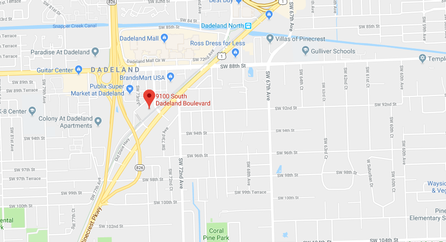

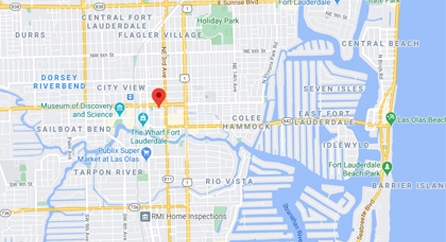
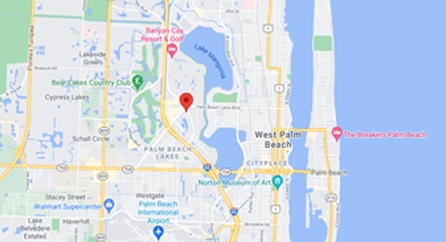


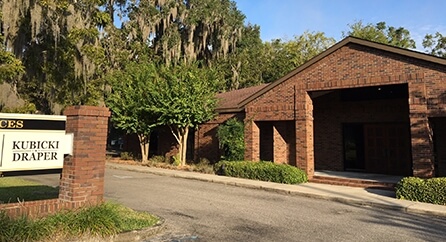












 .png)




